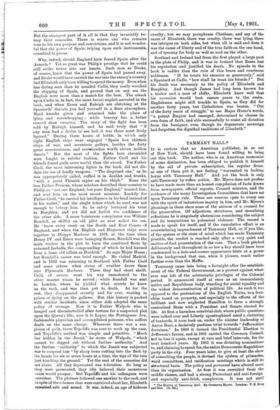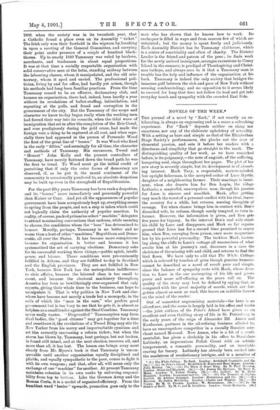TAMMANY HALL.*
IT is curious that no American publisher, in or out of New York, should have been found willing to bring out this book. The author, who is an American economist of some distinction, has been obliged to publish it himself by the aid of private subscription, the regular firms, as one of them put it, not feeling " warranted in locking horns with Tammany Hall." And yet the book is only anti-Tammany by reflex action. Mr. Myers does not profess to have made more than an honest compilation of facts drawn from newspapers, official reports, Council minutes, and the evidence of the many Investigation Committees that have sat upon Tammany rule. These are sources open to every one with the spirit of industrious inquiry in him, and Mr. Myers's gleanings in them show none of the animus of a counsel for the prosecution. Of adjectives, strictures, and moralising reflections he is singularly abstemious considering the subject and its temptations to polemical violence. The record is made to speak for itself, and if the cumulative effect is an overwhelming impeachment of Tammany Hall, or, if you like, of the system or the state of mind which has made Tammany possible, the verdict is reached only after a very quiet and matter-of-fact presentation of the case. That a book pitched deliberately and throughout in so low a key should have been condemned to a hole-and-corner appearance hints at a power in the background that can, when it pleases, reach rather further even than the Maffia.
Tammany came into being a fortnight after the establish- ment of the Federal Government, as a protest against what- ever was left of the aristocratic privileges of the Colonial period. It announced itself at once as an immaculately native and Republican body, standing for social equality and the widest democratisation of political life. As such it was opposed to the pretensions of the English Tories, to a fran- chise based on property, and especially to the efforts of the brilliant and now neglected Hamilton to form a strongly centralised State with a President and Senate elected for life. At first a harmless convivial club, where public questions'
were talked over and Liberty apostrophised amid a clattering of tankards, it soon took on, under the sinister leadership of Aaron Burr, a decisively partisan twist towards " Jeffersonian doctrines." In 1800 it turned the Presidential Election in Jefferson's favour, and in 1801 carried the Common Council, not to lose it again, except at rare and brief intervals, for the next hundred years. By 1805 it was dictating nominations to, and claiming to speak for, the entire Democratic-Republican party in the city. Four years later, to give at least the show of consulting the people, it devised the system of primaries, ward committees, and ratification meetings which is still its
structural basis. The policy and personnel have altered more than its organisation. At first it was recruited from the middle classes, and had a strong Protestant and anti-foreign and especially anti-Irish, complexion. It was not until • The History of Tammany Bali. By Gustavus Myers. London: P.S. King and Son. r7s. 6d.)
1809, when the society was in its twentieth year, that a Catholic found a place even on its Assembly " ticket." The Irish only won their foothold in the wigwam by,breaking in upon a meeting of the General Committee, and carrying their point under pressure of a couple of hundred black- thorns. Up to nearly 1840 Tammany was ruled by bankers, merchants, and tradesmen in about equal proportions. It was at that time a socially respectable organisation with solid conservative men at the helm, standing midway between the labouring classes, whom it manipulated, and the old aris- tocracy, whom it aped and envied. The professional poli- tician, living by and for office, had hardly yet arisen, though his methods had long been familiar practices. From the time Tammany ceased to be an effusive, declamatory club, and became an organisation, there had, indeed, been hardly a• year without its revelations of ballot-stuffing, intimidation, and repeating at the polls, and fraud and corruption in the government of the city. But the Tammany of the scope and character we know to-day began really when the working men had forced their way into its councils, when the tidal wave of immigration that set in after the completion of the Erie Canal, and rose prodigiously during the gold craze, had made the foreign vote a thing to be captured at all cost, and when espe- cially there had appeared in the person of Fernando Wood the first of the great line of " bosses." It was Wood who fixed in the early " fifties," and seemingly for all time, the character and methods of Tammany. His successors, Tweed and " Honest " John Kelly and the present controllers of Tammany, have merely flattened down the broad path he was the first to tread. To Wood must go the initial credit of perceiving that if only the outer forms of democracy are observed, if, as he put it, the moral sentiment of the community is occasionally pandered to, an absolute despotism may be built up even in the stronghold of Republicanism.
For the past fifty years Tammany has been such a despotism, and its "bosses" more immediately and personally powerful than Kaiser or Czar. And yet all the appearances of popular government have been scrupulously kept up, everything seems to spring from the people, and not a step is taken which could not logically claim the authority of popular sanction. In reality, of course, packed primaries select " machine " delegates to attend nominating conventions that endorse, while seeming to choose, the candidates whom the " boss " has determined to honour. Morally, perhaps, Tammany is no better and no worse than a host of other " machines," Republican and Demo- cratic, all over the States. It has become more conspicuous because its organisation is better and because it has systematised the art of carrying elections. Democracy asks for its successful working three things,—public spirit, intelli- gence, and leisure. These conditions were pre-eminently fulfilled in Athens, and they are fulfilled to-day in Scotland and the English provinces. They are not fulfilled in New York, because New York has the metropolitan indifference to civic affairs, because the leisured class is too small to count, and because the electoral machinery throughout America has been so bewilderingly over-organised that only experts, giving their whole time to the business, can hope to manipulate it. That is why politics in New York and else- where have become not merely a trade but a monopoly, in the coils of which the " man in the cars," who prefers good government but is too busy to see that he gets it, is almost as helpless as a small trader against the Steel Combine. Tammany never really wastes. " Disgruntled " Tammanyites may form 'rival bodies, the "good citizens" may get together for a time and overthrow it, the revelations of a Tweed Ring may stir the New Yorker from his merry and imperturbable cynicism and set him earnestly canvassing a reform ticket; but when the storm has blown by, Tammany, bent perhaps, but not broken, is found still intact, and at the next election recovers all, and more than all, it has lost. The lesson one brings away most clearly from Mr. Myers's book is that Tammany is uncon- querable until another organisation equally disciplined and pliable, and equally sympathetic to the poor, comes to fight it with its own weapons ; and that, after all, will mean only the exchange of one "machine" for another. At present Tammany maintains cohesion in its own ranks by enforcing responsi- bility from top to bottom. Like the German Army and the Roman Curia, it is a model of organisedefficieney. From the humblest ward "heeler" upwards, promotion goes only to the
man who has shown that be knows how to work. Its exchequer is filled in ways and from sources few of which are untainted ; but the money is spent freely and judiciously. Each Assembly District has its Tammany clubhouse, which is a centre of conviviality and often of charity. The District Leader is the friend and patron of the poor ; he finds work for the newly arrived immigrant, arranges excursions to Coney Island in the summer, is prodigal of Thanksgiving and Christ- mas turkeys, and always sees to it that a Tammany man in trouble has the help and influence of the organisation at his back. Tammany is indeed the only society that bridges the immense gulf between the rich and poor of New York without seeming condescending ; and no opposition to it seems likely to succeed for long that does not follow its lead and get into everyday touch and sympathy with the crowded East Side.











































 Previous page
Previous page